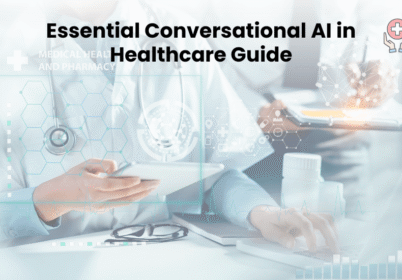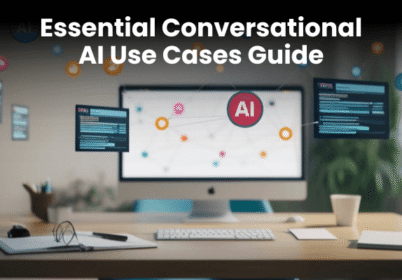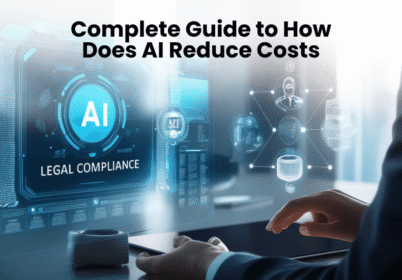Agentic AI in Healthcare: Benefits, Applications & Future Impact

Table of Contents
Healthcare faces a data crisis. By 2025, the medical field will generate over 10 zettabytes of data, yet only 3% is used effectively. This overwhelming amount of information leaves doctors struggling to keep up, potentially affecting patient care.
The healthcare sector faces massive challenges, data overload, fragmented systems, and increasing patient demands. Enter Agentic AI in healthcare – a breakthrough technology that acts as an intelligent assistant for medical professionals. Unlike traditional AI, these systems can think, plan, and take action on their own, helping doctors make faster and better decisions about patient care.
This article explores how Agentic AI is transforming healthcare by tackling three major challenges: handling massive amounts of medical data, coordinating complex care plans, and breaking down communication barriers between departments. We’ll look at real examples of how this technology helps doctors spend less time on paperwork and more time with patients, leading to better healthcare for everyone.
Table of Contents
What is Agentic AI
Agentic AI represents a new generation of artificial intelligence that can think and act independently to achieve specific goals. Unlike traditional AI systems that follow fixed rules, Agentic AI can analyze situations, make decisions, and adjust its actions in real-time.
For example, in a hospital setting, it can monitor patient vital signs, detect concerning patterns, and automatically alert medical staff without waiting for human input.
The technology operates through three core capabilities: autonomous decision-making, continuous learning from outcomes, and goal-oriented behavior. According to industry data, organizations implementing Agentic AI report a 40% improvement in operational efficiency and a 35% reduction in response times across various processes.
This advanced form of AI has already shown success in fields like manufacturing, finance, and logistics, but healthcare presents unique opportunities for its problem-solving capabilities. In healthcare, for instance, it reduces cognitive overload by integrating medical imaging, patient histories, and lab results to support accurate diagnoses and personalized care.
How Agentic AI Works?
Agentic AI operates through a sophisticated system of interconnected components that work together to analyze data and make decisions. Here’s the breakdown of how it works?
- Real-Time Data Analysis: Continuously processes data from multiple sources, including patient records and imaging.
- Proactive Decision-Making: Identifies and addresses potential issues before they escalate.
- Collaboration Among Agents: Specialized agents share insights and coordinate tasks.
- Autonomous Learning: Learns from new data to improve accuracy and efficiency.
- System Integration: Connects seamlessly with hospital systems to ensure workflow harmony.
Agentic AI in Healthcare
Agentic AI transforms healthcare by serving as an intelligent assistant that supports medical professionals across multiple tasks. The system can analyze complex medical images, interpret lab results, and process patient histories simultaneously – tasks that would take hours for human doctors to complete manually.
Recent studies show that healthcare facilities using Agentic AI in Healthcare have led to reduce diagnostic time by up to 30% and improved accuracy rates by 25%. The technology excels at identifying patterns in patient data, predicting potential health issues, and suggesting personalized treatment plans.
For example, when monitoring cancer patients, Agentic AI can track treatment responses, adjust medication schedules, and coordinate care between different departments automatically. This leads to more efficient patient care and allows healthcare providers to focus on direct patient interaction.
Specialized Agentic AI Include in Healthcare
Modern healthcare requires specialized AI agents to handle different aspects of patient care and medical operations. These agents work together to create a comprehensive healthcare system.
- Clinical Data Specialist Agents: Analyze patient histories and medical notes for crucial insights.
- Molecular Analysis Agents: Decode genetic data for personalized treatments.
- Imaging Data Agents: Process X-rays, MRIs, and CT scans to detect abnormalities.
- Scheduling and Coordination Agents: Automate appointments and manage workflows across departments.
- Decision Support Agents: Recommend treatment options based on evidence and real-time data.
- Monitoring Agents: Track patient vitals through wearables for proactive interventions.
Roles and Impact of Agentic AI on Healthcare Industry
Agentic AI brings significant changes to healthcare by streamlining operations and enhancing patient care quality. Research indicates that healthcare facilities implementing Agentic AI solutions have seen a 40% reduction in administrative tasks and a 35% improvement in patient outcomes. This technology transforms several key areas of healthcare delivery.
Diagnostic Support and Clinical Decision-Making
Agentic AI enhances medical diagnosis through rapid analysis of patient data, medical imaging, and clinical records. The technology processes complex medical information in seconds, helping doctors identify potential health issues early.
Studies by NIH show that AI-assisted diagnoses achieve accuracy rates up to 95% in specific medical conditions, particularly in radiology and pathology. This support allows healthcare providers to make faster, more informed decisions about patient care.
Patient Care Coordination
The technology revolutionizes care coordination by automating appointment scheduling, treatment tracking, and interdepartmental communication. Agentic AI systems monitor patient progress across different departments, ensure timely follow-ups, and maintain consistent care protocols. This coordination reduces treatment delays by 30% and improves patient satisfaction scores by 25%.
Administrative Efficiency
Agentic AI streamlines administrative tasks by automating documentation, insurance claims processing, and inventory management. Healthcare facilities report saving 15-20 hours per week per staff member on paperwork. This automation allows medical professionals to spend more time with patients and focus on direct care activities.
Predictive Analytics and Risk Assessment
Through continuous analysis of patient data, Agentic AI identifies potential health risks before they become serious issues. The system monitors vital signs, medication responses, and lifestyle factors to predict possible complications. Hospitals using these predictive capabilities report a 28% reduction in preventable readmissions according to PubMed.
Accelerating Drug Discovery
In pharmaceutical research, Agentic AI speeds up drug discovery by analyzing large volumes of clinical and genetic data. It identifies potential compounds, predicts outcomes of clinical trials, and reduces development costs. This has shortened the timeline for creating life-saving drugs significantly.
Personalized Treatment Planning
Agentic AI creates customized treatment plans by analyzing individual patient data, genetic information, and treatment response patterns. This personalization leads to better treatment outcomes and reduces adverse reactions to medications by 20%. The system continuously adjusts recommendations based on patient progress and new medical research.
Improving Care Coordination
Agentic AI integrates data from multiple departments, reducing fragmentation in healthcare systems. It automates workflows like appointment scheduling, resource allocation, and follow-ups. This ensures timely care delivery, minimizes errors, and improves patient experiences. Hospitals also benefit from reduced administrative burdens, allowing staff to focus on critical tasks.
Revolutionizing Remote Patient Monitoring
Wearable devices paired with Agentic AI allow continuous patient monitoring. Data from devices like smartwatches is analyzed in real-time, detecting anomalies such as irregular heartbeats or drops in oxygen levels. This proactive approach prevents complications and enhances patient safety.
Challenges in Implementing Agentic AI in Healthcare
While Agentic AI offers tremendous benefits, healthcare organizations face several significant challenges in implementation. These barriers range from technical infrastructure requirements to staff acceptance and regulatory compliance. Understanding these challenges helps organizations prepare for successful AI integration.
Data Privacy and Security Concerns
Healthcare organizations must protect sensitive patient information while implementing AI systems. This includes ensuring HIPAA compliance and maintaining data security across all AI operations. Recent reports show that healthcare data breaches cost an average of $9.23 million per incident, making security a top priority in AI implementation.
Technical Integration Issues
Many healthcare facilities struggle to integrate AI systems with existing electronic health records (EHR) and medical equipment. The process requires significant technical expertise and infrastructure updates. Organizations typically need 6-12 months for full integration and staff training.
Cost and Resource Allocation
Implementing Agentic AI requires substantial financial investment in technology, training, and maintenance. Initial setup costs can range from $500,000 to several million dollars, depending on facility size. Organizations must balance these costs against expected benefits and ROI timelines.
Staff Training and Acceptance
Medical professionals often show resistance to adopting new technologies. Training staff to effectively use AI systems takes time and resources. Healthcare facilities report needing an average of 3-4 months for staff to become comfortable with new AI tools. Clear communication about AI benefits and limitations helps improve acceptance rates.
Resistance from Healthcare Professionals
AI adoption often faces resistance from medical staff due to fears of job displacement or mistrust in technology. Transparent communication about AI’s supportive role, rather than a replacement, can help address these concerns. Adequate training programs are necessary to ensure smooth transitions.
Regulatory Compliance
Healthcare organizations must navigate complex regulatory requirements while implementing AI systems. This includes ensuring AI decisions align with medical standards and maintaining proper documentation for regulatory audits. Regular updates to AI systems must also comply with evolving healthcare regulations.
The healthcare sector may fully utilize agentic AI by tackling these issues, which would guarantee greater results and enhanced patient care.
The Future of Agentic AI in Healthcare
By 2030, experts predict Agentic AI will revolutionize healthcare delivery with advanced capabilities in personalized medicine, real-time diagnostics, and automated care coordination. Market analysts forecast the healthcare AI market to reach $187.95 billion by 2030, growing at a CAGR of 38.5%.
Advanced Personalized Medicine
Agentic AI will enable ultra-personalized treatment plans by analyzing vast amounts of patient data, including genetic markers, lifestyle factors, and treatment responses. Advanced algorithms will predict treatment outcomes with higher accuracy, leading to more effective and targeted therapies.
AI-Powered Predictive Healthcare
Future systems will predict health issues before symptoms appear. Predictive models will analyze genetic data and health trends, enabling personalized preventive care plans. This could significantly reduce disease onset rates.
Advanced Robotics and Automation
Robotic systems powered by Agentic AI will perform complex surgeries with unparalleled precision. Automated hospital workflows, like smart resource allocation and real-time patient monitoring, will become standard practices.
Integrated Care Systems
Future healthcare systems will feature seamlessly connected Agentic AI platforms that coordinate care across all medical specialties. These systems will automatically share patient information, schedule appointments, and adjust treatment plans in real-time based on patient responses.
Preventive Healthcare Evolution
Agentic AI will transform preventive care through continuous monitoring and early intervention. Smart devices and AI systems will work together to detect potential health issues before they become serious, enabling proactive rather than reactive healthcare.
Continuous Learning and Adaptation
AI systems will evolve by learning from real-time data and medical research. This adaptability will ensure healthcare practices remain cutting-edge.
The future promises a healthcare system that is efficient, personalized, and inclusive with Agentic AI at its core.
Ethical Issues of Agentic AI in Healthcare
As healthcare increasingly relies on AI systems, several ethical concerns require careful consideration to ensure patient safety and privacy.
- Data Privacy: AI relies on sensitive patient information, raising concerns about unauthorized access.
- Bias in Algorithms: AI systems can reflect biases in training data, leading to unequal treatment outcomes.
- Accountability: Determining responsibility for AI-driven errors is complex and legally challenging.
- Transparency: AI decisions can lack explainability, making it hard for clinicians to trust recommendations.
- Equity in Access: High costs may limit AI’s availability to underserved communities.
Why Healthcare Leaders Should Embrace Agentic AI Today?
Healthcare organizations that adopt Agentic AI early gain significant advantages in efficiency, patient care quality, and operational costs. Such as.
- Improved Patient Outcomes: AI enhances diagnostic accuracy and treatment efficiency.
- Operational Efficiency: Automating workflows reduces costs and administrative burdens.
- Scalable Solutions: AI extends healthcare access to remote and underserved areas.
- Competitive Edge: Early adopters position themselves as industry leaders.
- Future-Ready Systems: Integrating AI now ensures smoother transitions to emerging technologies.
FAQs
Can AI agents be integrated into existing healthcare systems?
Yes, modern Agentic AI systems integrate seamlessly with electronic health records, hospital management software, and medical devices through secure APIs.
What are the key benefits of Agentic AI in healthcare?
Agentic AI reduces administrative work, improves diagnostic accuracy, enables personalized treatment plans, and helps doctors spend more time with patients.
How does Agentic AI differ from other types of AI in healthcare?
Agentic AI makes autonomous decisions, learns continuously, and adapts strategies in real-time, unlike traditional AI that follows fixed programming.
Is Agentic AI cost-effective for small healthcare practices?
While initial costs are high, small practices can see positive ROI through reduced administrative costs and improved efficiency within 12-18 months.
What kind of AI is used in healthcare?
Healthcare uses machine learning, natural language processing, computer vision, and predictive analytics to support diagnosis, treatment, and administrative tasks.
What is the role of Agentic AI in care delivery?
Agentic AI coordinates patient care, analyzes medical data, automates administrative tasks, and provides decision support for healthcare providers in real-time.
Summary
Agentic AI in Healthcare marks a transformative shift in healthcare delivery. This technology addresses critical challenges by processing vast medical data, coordinating complex care plans, and breaking communication barriers across departments. The results speak volumes – a 40% reduction in administrative tasks, 95% diagnostic accuracy, and 30% fewer treatment delays.
Looking ahead, healthcare organizations implementing Agentic AI position themselves at the forefront of medical innovation. The projected market growth to $187.95 billion by 2030 underscores its rising importance. While challenges exist in implementation, the benefits of enhanced patient care, streamlined operations, and improved medical outcomes make Agentic AI an essential tool for modern healthcare.
For healthcare leaders, embracing Agentic AI isn’t just about staying competitive, it’s about shaping a future where technology and human expertise combine to deliver better patient care.
Ashikul Islam
Ashikul Islam is an experienced HR Generalist specializing in recruitment, employee lifecycle management, performance management, and employee engagement, with additional expertise in Marketing lead generation, Content Writing, Designing and SEO.
Related Post
How Conversational AI Improves Healthcare
Have you ever waited on hold for healthcare appointments, transferred multiple times before getting simple answers?...
Conversational AI Use Cases That Drive Revenue
Are you frequently considering how technology could revolutionize your business operations? Conversational AI use cases are...
How Does AI Reduce Costs? A Guide to Business Cost Optimization
Are you lying awake wondering how your business can survive rising operational costs? Have you watched...




